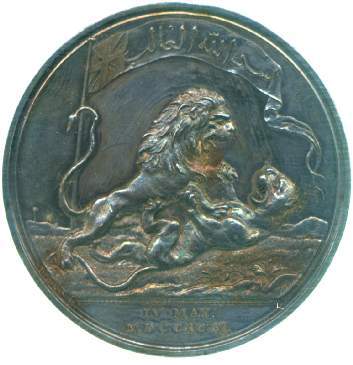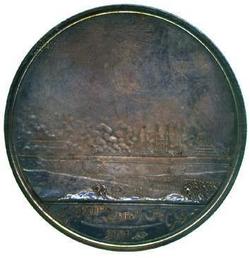Current Location: In storage
Maker(s)
Mint:
Birmingham
Issuer:
East India Company
Artist:
Küchler, Conrad Heinrich
Ruler:
George III (1760-1820)
(Inferred)
Entities
Categories
Description
One of the principal opponents to the rise of the power of the British East India Company's influence in India was the Kingdom of Mysore, centred on the eponymous city in southern India. The first military clash between the powers led Mysore to seek French aid, and the French East India Company was glad to have an ally against the more successful British Company. This alliance however tended to involve Mysore in the eighteenth-century wars between France and Britain without necessarily supporting Mysore when that kingdom came up against the British.
The military rise of Emperor Napoleon Bonaparte renewed this opposition in 1798 as Napoleon invaded Egypt in an attempt to cut off the British Empire's eastern possessions, and Tipu Sultan's Mysore readily joined the attack. The rapid defeat of the Egyptian campaign left Mysore in an awkward position, as Lord Arthur Wellesley had mustered forces that Mysore could not hope to resist. The key to the campaign was the capture of the capital Sriringapatnam in May 1799, in which attack Tipu Sultan was killed. After this Mysore was rapidly placed under British suzerainty.
The East India Company issued this medal to their troops who had taken part in the siege and capture of Tipu Sultan's capital, in various metals for different ranks. The medal was made in small numbers in India but the bulk of the issue was done at the Soho mint in Birmingham, and this silver example came from there. The medal was issued unnamed, and the recipient, one of 850 of pieces in this metal, is therefore unknown. Lester Watson purchased this example from the dealer Lowe at some point before 1928.
Notes
History note: Gift of L. Hoyt Watson; ex Lester Watson Collection, bt Lowe before 1928
Legal notes
Given by Lester Watson through Cambridge in America, 2009
Measurements and weight
Diameter: 48.2 mm
Weight: 45.88 g
Acquisition and important dates
Method of acquisition: Given
(2009)
by
Watson, Lester
Dating
Production date:
AD 1808
Materials used in production
Silver
Techniques used in production
Struck
Inscription or legends present
Inscription present: Lion and tiger locked in combat
- Text: IV MAY MDCCXCIX
- Location: Obverse
- Type: Design
Inscription present: Siege party entering breached walls of a fortress
- Location: Reverse
- Type: Design
References and bibliographic entries
Identification numbers
Accession number: CM.1431-2009
Primary reference Number: 141525
Watson Catalogue: 343
Ordering: M-0314
Previous object number: LW.0314
Stable URI
Audit data
Created: Saturday 6 August 2011
Updated: Monday 25 March 2024
Last processed: Wednesday 14 May 2025
Associated departments & institutions
Owner or interested party:
The Fitzwilliam Museum
Associated department:
Coins and Medals





